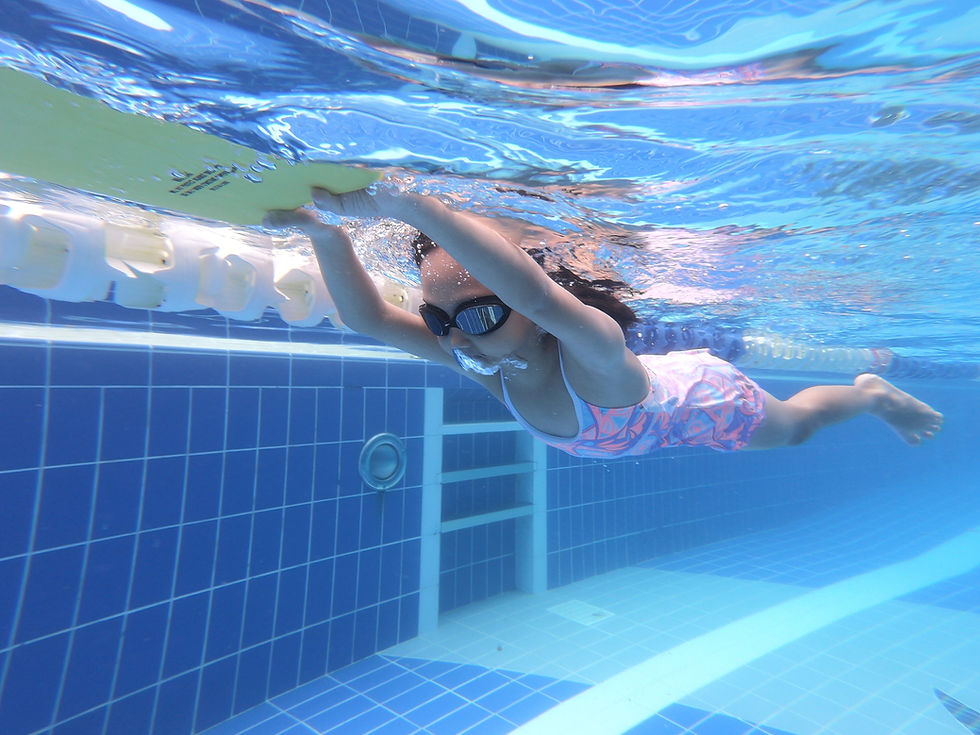IM Breathing Technique Drills: Minimizing Drag and Resistance
- SG Sink Or Swim

- Jul 28, 2025
- 3 min read

When it comes to swimming the Individual Medley (IM), mastering breathing technique is just as critical as stroke mechanics. Because IM combines all four strokes—butterfly, backstroke, breaststroke, and freestyle—each with distinct breathing patterns, poor breath timing or body positioning can quickly increase drag, disrupt rhythm, and cost you valuable time and energy.
This article breaks down how to improve your breathing technique across all strokes in the IM using targeted drills designed to minimize resistance and enhance efficiency.
🧠 Why Breathing Technique Matters in IM
Every breath you take in swimming affects:
Hydrodynamics – Improper head position increases drag.
Timing and flow – Mistimed breathing throws off stroke rhythm.
Oxygen efficiency – Shallow or erratic breathing leads to fatigue.
In IM events, where you change techniques mid-race, good breathing form can be the difference between staying strong or fading out in the final 50 meters.
🏊♂️ Stroke-by-Stroke Breathing Issues and Drill Solutions
🦋 Butterfly: Drill for Low-Breath Recovery
Problem: Lifting the head too high disrupts the body line and increases drag.
Drill: 3-1-3 Butterfly Breathing
Swim three butterfly strokes without breathing, then one with breath.
Focus on keeping the breath low and forward, with the chin just skimming the water.
Reinforces forward motion and minimizes vertical movement.
✅ Improves breath timing and reduces drag.
🔄 Backstroke: Drill for Controlled Exhale
Problem: Holding the breath leads to tension and poor body position.
Drill: Bubble Nose Exhale Drill
Practice a steady exhale through the nose while swimming backstroke.
Add a tempo trainer to maintain consistent arm timing.
Promotes rhythm and relaxed breathing, especially under fatigue.
✅ Reduces tension and improves streamline.
🐸 Breaststroke: Drill for Head Timing and Streamline Recovery
Problem: Lifting the head too early or too long causes resistance.
Drill: Glide-and-Breathe Drill
Pull, breathe, kick, then hold the streamline glide for 3 seconds.
Emphasize quick inhale and smooth head return into the water.
Teaches efficient head movement and patience in the glide.
✅ Trains quick, drag-free breath execution.
🏁 Freestyle: Drill for Side Breathing and Body Rotation
Problem: Over-rotating or lifting the head breaks streamline.
Drill: Catch-Up with Side Breathing
Perform catch-up freestyle, breathing only to one side every 3 strokes.
Emphasize rotating the body, not the head alone.
Use a snorkel initially to isolate arm technique, then add breathing.
✅ Enhances timing and encourages clean breathing motion.
🔁 IM-Specific Combo Drills for Breathing Flow
🔄 IM Transition Breathing Drill
How to do it:
Swim 25m of each stroke in IM order (Fly, Back, Breast, Free)
Focus only on breathing timing across transitions, not speed
Use moderate effort and controlled strokes
✅ Builds breathing consistency between strokes.
🌬️ Breath Control Pyramid
Purpose: Improves breath regulation under stress and fatigue
Set Example:
4x25 IM strokes @ 1 breath per 25
4x25 IM strokes @ 2 breaths per 25
4x25 IM strokes @ 3 breaths per 25
Descend effort as breath count increases
✅ Trains lung control and mental focus across all strokes.
💡 Bonus Tips to Reduce Drag While Breathing
✅ Keep the head aligned — avoid lifting or turning too far
✅ Exhale underwater — don’t waste time above water blowing out air
✅ Don’t rush the breath — time it with natural stroke flow
✅ Engage the core — maintain a streamlined body line even during breath
🏁 Final Thoughts
In IM events, breathing technique must be fluid, efficient, and adaptable to each stroke’s demands. Through focused drills and attention to head positioning, breath timing, and body control, swimmers can minimize drag, conserve energy, and stay fast from the first fly stroke to the final freestyle.





Comments